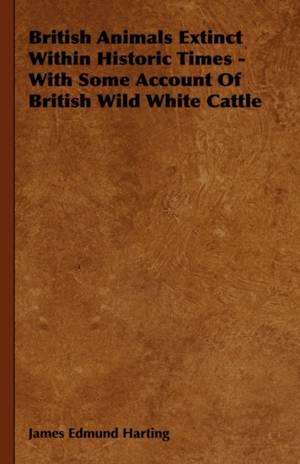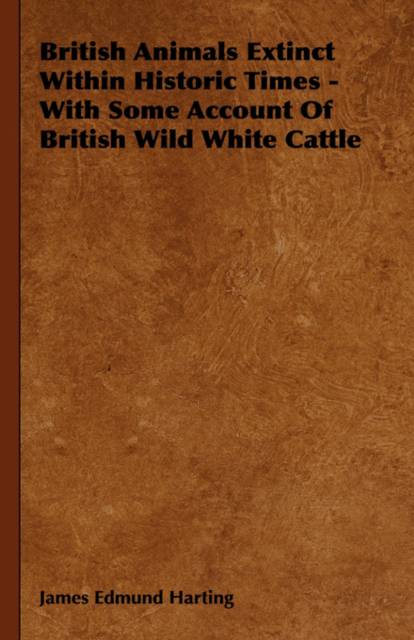
Je cadeautjes zeker op tijd in huis hebben voor de feestdagen? Kom langs in onze winkels en vind het perfecte geschenk!
- Afhalen na 1 uur in een winkel met voorraad
- Gratis thuislevering in België vanaf € 30
- Ruim aanbod met 7 miljoen producten
Je cadeautjes zeker op tijd in huis hebben voor de feestdagen? Kom langs in onze winkels en vind het perfecte geschenk!
- Afhalen na 1 uur in een winkel met voorraad
- Gratis thuislevering in België vanaf € 30
- Ruim aanbod met 7 miljoen producten
Zoeken
British Animals Extinct Within Historic Times - With Some Account of British Wild White Cattle
James Edmund 1841 Harting
Hardcover | Engels
€ 44,95
+ 89 punten
Uitvoering
Omschrijving
BRITISH ANIMALS EXTINCT WITHIN HISTORIC TIMES - WITH SOME ACCOUNT OF BRITISH WILD WHITE CATTLE by JAMES EDMUND HARTING. PREFACE: FEW who have studied the literature of British Zoology can have failed to remark the gap which exists between Owens British Fossil Mammals and Birds, and Bells British Quadrupeds the former dealing chiefly with prehistoric remains, the latter with species which are still existing. Between these two admirable works a connecting link, as it were, seems wanting in the shape of a history of such animals as have become extinct in Britain within historic times, and to supply this is the aim ofthe present writer. Of the materials collected, during many years of research, some portion has been already utilized in a Lecture delivered by the author before the Hertfordshire Natural History Society, in October, 1879, and in several articles in the Popular Science Eeview and the natural history columns of The Field. The exigencies oftime and space, however, necessitated a much briefer treatment of the subject in the journals referred to than is here attempted, and to these essays, now presented to the reader in a con- solidated form, considerable additions have been made. That the subject admits of still further amplifica- tion the author is well aware but ars long a vita brevis est and the materials at present collected have already assumed such dimensions, that it has been deemed preferable to offer them to the reader in their present form, rather than postpone publica- tion indefinitely, in the hope ofsome day realizing an ideal state of perfection. Should the present volume pave the way for future research on the part of others, the Author will be amongst the first to welcome the result of their labours. He has already to acknowledge his indebtedness to Dr. J. A. Smith and Messrs. Edward Alston, J. A. Harvie Brown, and J. P. Hoare, whose taste in the same line of research has prompted them to favour him with several interesting commu- nications, which have been embodied in the following pages while to Dr. Smith he is especially obliged for the use of four woodcuts which were prepared to illustrate papers of his own in the Proceed- ings of the Society of Antiquaries of Scotland. In regard to that portion of the present work which treats of the ancient breed of wild white cattle, it may be thought, by some, a little presump- tuous on the part of the writer to deal witha subject on which an entire volume has been so recently and so ably written by the late Mr. Storer. But it should be stated that almost all the materials for this portion of the book were not only collected long before Mr. Storers work was published, but were on the eve of being incorporated in an important essay by Mr. Edward Alston, which was nearly ready for the press when Mr. Storers volume appeared. ft would be ungenerous, however, on the part of the writer were he to withhold an acknowledgment of his indebtedness to Mr...
Specificaties
Betrokkenen
- Auteur(s):
- Uitgeverij:
Inhoud
- Aantal bladzijden:
- 272
- Taal:
- Engels
Eigenschappen
- Productcode (EAN):
- 9781443726900
- Verschijningsdatum:
- 4/11/2008
- Uitvoering:
- Hardcover
- Formaat:
- Genaaid
- Afmetingen:
- 140 mm x 216 mm
- Gewicht:
- 494 g

Alleen bij Standaard Boekhandel
+ 89 punten op je klantenkaart van Standaard Boekhandel
Beoordelingen
We publiceren alleen reviews die voldoen aan de voorwaarden voor reviews. Bekijk onze voorwaarden voor reviews.









